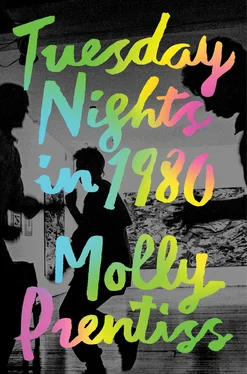Not to mention, he saw out of the corner of his eye, the pleasure Marge got out of even the most moderate of his successes.
“James has a piece coming out today!” he overheard her telling her mother on the phone. This was novel, considering that for years she had avoided uttering his name to her mother, who only worried about when that son-in-law of hers was going to get a real job.
“Front page!” Marge bragged. “Keep an eye out, okay, Mom?”
Marge didn’t seem to mind that she had to pick up most of the slack moneywise (art writing paid enough but never more than that, and what James earned was more than likely spent on buying more art). She believed in him, she said, and she knew doing the thing he loved would pay off eventually. In a special moment of pride (and perhaps a better understanding of personal presentation) Marge bought him a white suit at Bloomingdale’s, for more formal events or openings. He began to wear it quite often, despite that looking at it in the mirror made him smell ammonia and too-strong cologne.
But occasionally, when rent was due, for example, Marge was forced to plead with him about his art habit.
“We’re sort of going broke, James,” she’d say. “Do you see that we are sort of going broke?”
“I know, Marge, I know. It’s just, isn’t it stunning?”
That particular “it” could be anything from a miniature sketch by Richard Diebenkorn that James had ordered from California, or a mammoth spray-painted piece of cardboard by a young street artist that covered much of the living room’s east wall, which James had insisted on paying the kid a thousand dollars for.
“Of course it’s stunning,” Marge said. “But we have to live, you know? What good is art if we can’t live to enjoy it?”
“But what good is life without art?” James said, bringing her in for a hug.
“I just get worried,” she said, letting him kiss her head. “We’re in our thirties.”
“So?”
“So we’re in our thirties!”
“Tell me what being in our thirties means,” James said. “Considering it is almost 1980 and we live in New York City; I don’t think the suburban time line need apply to us.”
“James!” Marge said, hitting him playfully. “I want a teeny baby!”
“I’ll give you a teeny baby,” he said, but in a way that referred more to their joke and less to real life.
Marge leaned back and looked at him. “I’m being serious, James. Can you tell from my eyes?”
James put his finger on her chin and squinted.
“Let me check,” he said.
And here was their biggest real-life endeavor: Marge was now carrying four months’ worth of teeny baby inside of her — the size of an avocado, according to the woman who’d administered the sonogram that morning. To Winona’s party Marge had worn a burgundy dress, of the sort that hugged her shape rather than hiding it, and James, as if he were a kid again, found himself mentally aroused when he looked at her for too long. Marge’s stomach was soft and low, like a pile of sloping sand. Her breasts had grown in size and confidence, seeming to dictate to the lowly citizens (her feet, her back, her butt cheeks) how to stand and how to move. Her face had widened slightly, and paled. Layers of darkness had amassed under her eyes, and the result was something… well, pomegranate . Where she had felt strawberry to James before — wild and small and individual — she now felt pomegranate : she was holding a million seeds of new, red life.
The whole pregnancy thing had felt abstract to James until just today. He had been unable to immerse himself in the pure joy of it, and had even had the private urge to not think about it , since when he did he only seemed to worry. He worried that he would be a bad father, or worse, that he would not feel for his son or daughter the way he should, which was totally in love and in awe. He also selfishly wondered if a baby would transform his life into something he never signed up for, that his existence would shift completely to diaper duty and stroller rolling, and that he would not have time for or the urge to write. If he were to be completely honest, though of course with Marge he was not, he might go as far to admit that he was counting down his months and days of freedom, mentally cringing as they lapsed.
But today, when the technician had showed them the grainy sonogram, James had actually cried with happiness. It was the first ultrasound that had actually revealed something that made sense to James — a hand, a nose, a beating heart — and it had physically made his own heart ache. It was visually stunning: a white smudgy bean in the deep cone of black, like a negative of a photograph. The black cone made him hear his father’s mean voice, but the white bean made him taste salt, as if he had just run a marathon and was licking his lips of his own sweat. It was attachment to nature and commitment to the future. It was real. The baby was real life. And it was a miracle. And it was precisely this intersection of reality and miracle that kept James in awe of this life: a life that was indeed built with equal parts biology and beauty.
“Should we?” Marge said now, nudging her head toward Winona’s fogging glass door. Her voice was sticky and soft.
“We should,” he said.
Though it was freezing out, Winona’s guests were gathering outside, on the convent’s balcony, which was adorned with perilous-looking wrought-iron sculptures. James could spot the artists from a mile away: there was David Salle in his Picasso-inspired striped shirt, images of bodies projected on top of and above him, just like in his paintings. There was Baldessari, big and white-haired, who did not know how to dress for the cold; James could feel the California air radiating through his T-shirt, even from behind the glass. There was Keith Haring, whose mouse-ish size did not affect the bigness of his presence; when James looked at him, he saw entire cosmos.
What would happen to them all this year? How would 1980 change them, morph them, dictate their fates? Sometimes James worried for them, the artists he so loved and admired. The world, especially the art world, was changing; he could feel it. The city was handing out promises, dangling fame in front of even the most radical artists’ noses; in turn, a sharpness was being dulled. The brilliant bohemia he’d discovered when he’d moved to the Village had been ratcheted up a notch; pop had paved the way for commercialism and plastic and shine; there was a new air of possibility and a new wave of capital coming in, which gave the scene a new edge. There was the notion, now, that one could make it ; James had watched the luckier artists get snatched from the rubble and lifted into the cloud of success. The successful left behind them a residue of opportunity: the surreal, toxic cloud of fame and fortune that both motivated and toppled the rest of them. Even the number 8 of 1980 felt glossy and airy and shiny in his mind, like an unpoppable balloon, nothing like its bony predecessor, 7. The year ahead would either ooze with brightness or deflate with emptiness, or perhaps both. Only time — specifically midnight— would tell.
James followed Marge to the coatroom — Winona had dedicated a whole nun’s quarters to other people’s coats — and grabbed his own. It only occurred to him after Marge had already wrenched her first arm in to help her with hers; he pulled it over her other shoulder. As they headed toward the door they passed a blue-walled room, and something caught James’s eye. A white firework, the smell of smoke. The audible, wonderful flapping of butterfly wings. James got the quickest glimpse of a young man, standing in the blue room behind a large mahogany desk, a black mole jutting from his face and his eyes glossing with what looked to be tears, before Marge tugged on James’s sleeve and pulled him toward the door to the balcony.
Читать дальше












